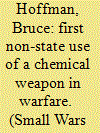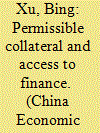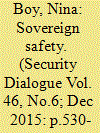| Srl | Item |
| 1 |
ID:
092304


|
|
|
|
|
| Publication |
2009.
|
| Summary/Abstract |
This article presents research conducted by the author in Sri Lanka to verify the first non-state use of a chemical weapon in warfare. This 1990 incident involved a primitive chemical attack perpetrated by the Liberation Tigers of Tamil Eelam (the LTTE or Tamil Tigers) on a Sri Lankan Armed Forces (SLAF) encampment in East Kiran, in the Batticaloa district of Sri Lanka. The article first describes the incident itself, before providing a brief description of the LTTE, its background, and the influence of its leader, Velupillai Prabhakaran. The article then analyzes the attack and places it within the context of theories about potential terrorist and insurgent use of unconventional weapons, such as chemical warfare agents. The research reported here is of interest not only because of the unique, opportunistic dimension of the attack, but also because its conclusions challenge the conventional wisdom about likely terrorist and insurgent use of these unconventional weapons and sheds new light on their interest and intentions in employing such weapons and tactics.
|
|
|
|
|
|
|
|
|
|
|
|
|
|
|
|
| 2 |
ID:
170098


|
|
|
|
|
| Summary/Abstract |
By allowing large classes of movable assets to be used as collateral, the Property Law reform transformed the secured transactions in China. Difference-in-differences tests show firms operating with ex-ante more movable assets expand access to bank credit and prolong debt maturity. However, the reform does not seem to improve the efficiency of credit allocation, as debt capacity of ex-ante low quality firms expands the most following the reform. Credit expansion also does not lead to better firm performance. These findings are not driven by confounding factors such as improvements in creditor and property rights protection. Our results also cannot be explained by other important reforms which were introduced around the same time as the introduction of the Property Law. These include anti-tunneling and split-share reforms and amendments to the corporate tax structure in China. We conduct explicit robustness tests for these other reforms and hence contribute to the empirical literature on the reform process in China with new findings.
|
|
|
|
|
|
|
|
|
|
|
|
|
|
|
|
| 3 |
ID:
094626


|
|
|
| 4 |
ID:
142497


|
|
|
|
|
| Summary/Abstract |
This article traces the contours of an inconspicuous kind of state power in the form of sovereign safety. This power is articulated, more precisely, in a combination of four elements: the historical term of public credit, the liquid government bond, the risk-free asset of financial textbooks and the safe-haven function assumed by the bond market in times of uncertainty. All of these involve a peculiar translation from sovereign debt as the most risky asset to sovereign creditworthiness, circulating unsecured. If critical security studies has largely limited itself to a critique of the relatively recent sense of political state security, this article explores the relevance of a far older financial sense of ‘security’ and ‘securitization’ for contemporary studies of security. So far, the Foucault-inspired finance–security literature has emphasized the risk calculus as a principal mechanism in ‘securing circulation’. This article argues that sovereign safety constitutes an important overlooked factor in securing circulation in two ways: As the main form of collateral for financial transactions, its capacity to secure derives from being considered secure itself. As an epistemic variable, it constitutes the bedrock of modern finance theory. Moreover, rather than neatly complementary to the liberal security dispositif, sovereign safety can to some extent be said to represent the very object of the Foucaultian divesture of power.
|
|
|
|
|
|
|
|
|
|
|
|
|
|
|
|